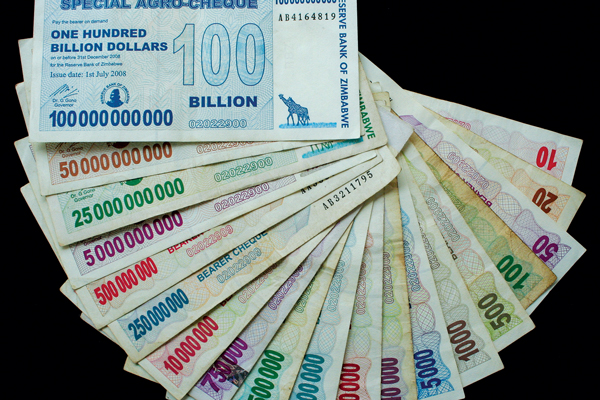
Economist Brains Muchemwa wrote an article on April 9 2017 entitled Rand Adoption Illogical. He is patently wrong. No! Competitiveness is not currency neutral as he supposes. Competitiveness, in addition to structural and macro wide issues also responds to the real exchange rate – itself a function of both the nominal exchange rate and inflation differentials between countries.
BY JOSEPH MVERECHA

If that was not the case, China would not have expanded on export-led growth for more than three decades, generating billions annually in trade and current account surplus by maintaining an undervalued exchange rate as core and integral framework of its export-led growth strategy — year after year and decade after decade.
In addition to structural challenges in Zimbabwe, one of the reasons why the country’s trade deficit is in excess of $3 billion a year is because of the strong currency — the US dollar, which makes imports cheaper and exports expensive in real terms.
This abiding problem of a strong currency has progressively, been compounded by the fact that the rand, the currency of our major trading partner has depreciated over 91% since August 2011 and will continue to depreciate. We may debate the magnitude but not the direction of where the rand is heading, heretofore.
What he raises validly as fuelling money supply growth — large and recurring fiscal deficits — this clearly contributes to the underlying macro imbalances, leading to growing trade and current account deficits, but this is also aided and abated by an appreciated real exchange rate, which is decimating exports.
Pointedly and correctly, improved business processes, Information Communication Technology innovations, new equipment — all these positively impact on productivity but if the underlying currency is too strong and strengthening day by day — that can create a firestorm in the desert for the economy.
As for the wholesale money printing which engineered the hyperinflation inferno of 2007/08 — I do not know if reasonable comparison can be made with the South African currency. There are challenges in SA both political and economic, but inflation is well below 6,5% and has never exceeded that threshold over the past years.
- Chamisa under fire over US$120K donation
- Mavhunga puts DeMbare into Chibuku quarterfinals
- Pension funds bet on Cabora Bassa oilfields
- Councils defy govt fire tender directive
Keep Reading
Trying to compare that to our situation in 2008, when the official inflation reached a staggering 231 million percent and climbing, may indeed be comparing an ant to an elephant. Unofficially, our inflation was several hundred billions, if not quintillions.
The Zimbabwean dollar in 2008 (or what was left of it), was the weakest currency but the real exchange rate was shooting through the stratosphere with debilitating effects on exports and industry capacity utilisation. From a macro policy point of view — what we do not see (such as the real exchange rate, the real interest and real wages) — these are some of the most important determinants for any economy, especially for small open economies like Zimbabwe, in particular beyond the near term.
To be sure adoption of the rand by itself — and if it becomes an end in itself – of course will not address the macro and structural challenges, which must be addressed through comprehensive reforms as a matter of priority.
In this regard, there is quite notable progress with respect to the “Doing Business” reforms spearheaded by the Office of the President and Cabinet and line ministries. The rand adoption will certainly not be a magic wand outside comprehensive reforms, but removing the real exchange rate problem of the dollar and its pervasive effects on the economy — this must be an integral part of the package of economy wide reforms, which must be instituted for recovery and sustained growth of the economy.
There are critical structural policies that must be implemented — with regards to fiscal policy, the investment environment, agriculture policy, State enterprise reforms, further doing business conditions, the cost of business — structural, macro and sectoral policy reforms as necessary to get the economy on growth path. But the issue of currency is at the core and the United States dollar is unsustainable.
Monetary authorities highlight that as much as $1,8 billion was externalised, (Governor’s monetary policy statement) — this is yet another hemorrhage, which comes as a result of a strong currency (dollar) which is used by all countries as a reserve currency, from Andorra to Vanuatu.
The dollar accounts for nearly 60% of the world’s international payments system and everyone wants that currency. Zimbabwe has become a gold mine for cheap transfer of dollars to the rest of the world and our economy is too small to sustain that. If, Zimbabwe had adopted the rand — the bane of externalisation would be immaterial. Who would fly from Lebanon or other countries to come to Zimbabwe and set up shop expressly, for the purpose of externalising the rand?
The dollar has magnetised all sorts of fly-by-night briefcase totting “hunters” from everywhere, whose main attraction is the dollar and they have been taking it out as evidenced by statistics from monetary authorities.
To suggest that the rand was “rejected” in the current multi-currency basket is to be deliberately subjective — at best partially truthful. Zimbabweans will not reject the rand as an option to the current scenario of endlessly long lines at banks for cash, provided, there is an even currency playing field and currently it is not there.
What we have is a multi-currency basket in theory — in practice it is a dollar environment with marginal references to a few other currencies. Anyone who accepts the rand, in the present dollar payments system immediately suffers loss of the order between $12 and $15 per every $100 by migrating from rand to make payments in a dollar environment.
Equivalently, the moon shines brightest at night when there is no sun.
At day break, the dominance of the sun is overpowering. If one were to analyse the moon during the day in the glowing brilliance of the sun, chances are very high, you may actually conclude that the moon has no capacity to illuminate.
Lastly, but not least — the issue of Germany and the eurozone highlighted in his article is quite illuminating — not on account of the Germany trade surpluses as gloriously painted, but more for what is omitted — the Greek crisis.
The strong Euro (modelled on the strong Germany deutsche mark by the Maastricht criteria) — the strength of the Euro has exacerbated the Greek crisis and there is no solution in sight. The triumvirate (the IMF, ECB and Germany) insist that the answer is more austerity for Greece. Now Greece (or more accurately, large segments of Greece) desperately wants to be part of the Euro or “Fortress Europe”.
As such she has done everything to try to adhere to the austerity medicine as prescribed, but with little success — Greek exports cannot expand even in areas where she has competitive advantage like the olive oils and refined petroleum sectors because at the core of the problem is an appreciated euro, which is too strong for the Greek economy.
Now we can say, the answer to the Greek problem is more production and productivity. Well said. But, the question is, how does Greece increase production when exports, which are part of the domestic production function are weighed down by a heavy and strong euro, which is too strong not only for Greeks, but other southern European states as well — Portugal, Spain and Italy?
The crisis in Greece has been deeper and lasted longer than comparable countries like South Korea and Thailand, which were among the countries hardest hit by the Asian crisis in 1997 and 1998. How is it that these countries were able to adjust following the crisis and achieve sustained growth path, a few years after the crisis? But Greece remains mired in a deepening crisis!
In the main, it reflects the fact that these Asian and other countries can adjust their nominal exchange rate to prevent a real exchange rate appreciation and of course, Greece cannot do that, as it is “married” to the euro. Not that, a Grexit would necessarily deliver breathtaking growth, but at least it provides options, not presently available to Greece.
Would Greece be better outside the strong Euro-modelled after the strong deutsche mark? Would Greece benefit from introducing its own weak currency and immediately devalue — sure, there will be adjustment costs and suffering in the near term, but beyond the near term — could there be possibilities for Greece?
If Zimbabwe is to have any chance of re-introducing her own currency inside the next decade and a half — the rand is the only option and we can have that option, without necessarily joining the Customs union.
There is no history in recent memory of a country completely dollarising and subsequently successfully de-dollarising just like that. The world is full of examples — El Salvador, Ecuador, Bolivia and Cambodia among others — not one country has managed to de-dollarise and revert to their own currencies, coming straight out of the US dollar.
Going forward, if dollars continue to flow out of the formal system, as at present maybe we will have only two options left — either a full scale return to the Zimbabwean dollar or the much maligned rand. An immediate return to the local currency is not sustainable — significant long term damage can be done to this economy through a hurried and injudicious return of the Zimbabwean dollar.
Unless we count on miracles, the only logical step to take is the rand, simultaneously addressing deep structural and macro imbalances, as necessary to get back our industry production to full capacity, increase exports, forex reserves and thereafter a graduated return of the local currency.
Joseph Mverecha is an economist with a local commercial bank. He writes in his personal capacity. He is reachable on: [email protected]










